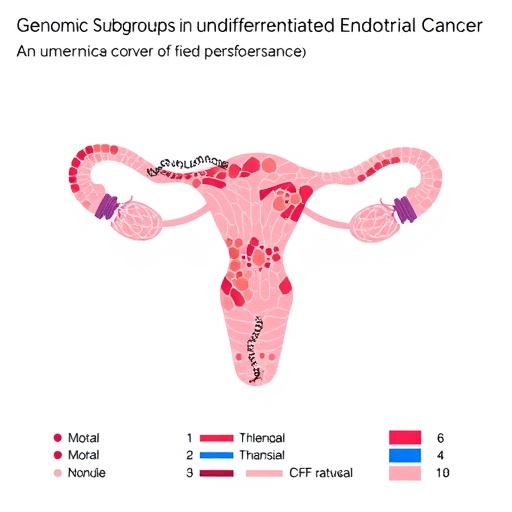In a groundbreaking study published in the latest issue of BMC Cancer, researchers have uncovered distinct genomic subgroups and mutational patterns in undifferentiated and dedifferentiated endometrial carcinoma (UDEC), a highly aggressive form of endometrial cancer. This research sheds new light on the molecular underpinnings of UDEC, revealing potential avenues for targeted therapies and prognostic stratifications that could significantly impact patient management.
Endometrial cancer remains a formidable global health challenge, accounting for a considerable mortality rate among gynecologic malignancies. UDEC, a particularly aggressive subset characterized by the loss of cellular differentiation, has long resisted effective treatment strategies, largely due to an incomplete understanding of its molecular drivers. By employing whole-exome sequencing (WES) on tumor samples from a well-defined cohort of 29 patients, the research team conducted an exhaustive genomic analysis that offers unprecedented insight into the disease’s complex biology.
The study identified three discrete molecular subgroups within the UDEC cohort: ultramutated, DNA mismatch repair (MMR)-deficient, and mutation-low tumors. Among these, 17% exhibited an ultramutated profile characterized by an exceptionally high burden of somatic mutations. Nearly half of the samples (48%) were found to be MMR-deficient, indicating a compromised DNA repair mechanism, while the remaining 35% harbored fewer mutations overall, categorized as mutation-low tumors. This stratification highlights the heterogeneous nature of UDEC and points to distinct pathways in its pathogenesis.
A cornerstone of the research was the identification of frequent mutations in SWI/SNF chromatin remodeling complex genes. Mutations in genes such as ARID1A, ARID1B, and SMARCA4 were observed in a remarkable 66% of cases, underscoring the vital role of chromatin remodeling dysfunction in the etiology of UDEC. The disruption of this complex is believed to fundamentally alter gene expression profiles, potentially facilitating the aggressive cellular phenotypes observed in these tumors.
Further deepening the mechanistic understanding, the team discovered recurrent mutations in well-known driver genes including PTEN, KMT2B, and PIK3CA, which have established roles in tumorigenesis across various cancer types. Their frequent alteration in UDEC suggests that these pathways may present valuable targets for therapeutic intervention. Of particular note was the prevalent homopolymer mutation RPL22^K15Rfs*5, predominantly found in 71% of MMR-deficient tumors, implicating this mutation as a potential biomarker for this subgroup.
The study’s survival analysis yielded intriguing findings: patients with ultramutated tumors exhibited notably better outcomes compared to those with MMR-deficient or mutation-low tumors. This counterintuitive observation raises questions about the biological impact of hypermutation on tumor behavior and immune recognition, suggesting that ultramutated tumors may be more immunogenic and thereby more responsive to emerging immunotherapies.
Beyond delineating the genetic landscape, this research holds promise for translational application. The delineation of molecular subgroups offers a framework for prognostic stratification and personalized treatment planning. For instance, tumors with SWI/SNF complex mutations might respond to novel drugs targeting chromatin remodeling pathways, while MMR-deficient tumors could benefit from immunotherapy regimens leveraging their high neoantigen load.
The comprehensive approach taken by the researchers involved analyzing somatic copy number alterations (SCNAs) alongside point mutations, painting a detailed picture of the genomic instability characteristic of UDEC. This integrative genomic profiling emphasizes the multifaceted nature of tumor evolution, where both small-scale mutations and large chromosomal aberrations interplay to drive malignant transformation.
Notably, this study was conducted within a single institution cohort, ensuring consistency in clinical data and tissue handling, which strengthens the validity of the findings. However, the authors acknowledge the need for larger, multicenter studies to validate these results and explore their applicability across diverse patient populations.
The implications of this research resonate beyond academic interest. By identifying actionable alterations and subgroup-specific mutational patterns, the study lays the groundwork for the development of targeted therapies and diagnostic tools that could revolutionize UDEC management. It also highlights the importance of molecular diagnostics in routine clinical practice, advocating for comprehensive genomic profiling in patients with this malignancy.
Ultimately, the findings underscore the complexity and heterogeneity of UDEC, challenging previous notions of a single-pathway disease and opening new vistas for therapeutic innovation. The authors emphasize that integrating genomic data with clinical parameters will be key to optimizing patient outcomes in the future.
This study exemplifies the power of next-generation sequencing technologies in unraveling the genetic intricacies of cancers previously defined only by histopathology. The detailed mutational landscape uncovered in UDEC not only enhances our biological understanding but also charts a path toward precision oncology in this difficult-to-treat cancer.
In summary, the research published in BMC Cancer identifies distinct genomic subgroups and mutational signatures in UDEC, providing critical insights into its biology and actionable targets for therapy. The discovery of the prevalent SWI/SNF complex mutations and the strong association with MMR deficiency with recurrent RPL22 mutations represent major advances in the field.
This landmark study importantly correlates molecular subtypes with patient outcomes, revealing improved survival in ultramutated tumors, which may alter future clinical decision-making. Consequently, these insights into UDEC promise to transform the landscape of diagnosis, prognostication, and treatment, ultimately offering hope for improved management of this aggressive endometrial carcinoma variant.
As the quest to conquer aggressive endometrial cancers continues, this study stands as a beacon of innovation, underscoring the critical role of comprehensive genomic characterization in unlocking tailored therapeutic opportunities for patients afflicted with UDEC.
Subject of Research: Genomic characterization and mutational analysis of undifferentiated and dedifferentiated endometrial carcinoma (UDEC).
Article Title: Distinct genomic subgroups and mutational patterns in undifferentiated/dedifferentiated endometrial carcinoma.
Article References:
Huang, CY., Chao, A., Lin, CY. et al. Distinct genomic subgroups and mutational patterns in undifferentiated/dedifferentiated endometrial carcinoma. BMC Cancer 25, 1540 (2025). https://doi.org/10.1186/s12885-025-15053-4
Image Credits: Scienmag.com
DOI: https://doi.org/10.1186/s12885-025-15053-4
Tags: aggressive gynecologic malignanciesDNA mismatch repair deficiency in cancergenomic subgroups in endometrial cancermolecular drivers of UDECmutation-low tumors in endometrial cancermutational patterns in UDECpatient management in endometrial cancerprognostic stratification in cancertargeted therapies for endometrial cancerultramutated tumors in endometrial carcinomaundifferentiated endometrial carcinoma researchwhole exome sequencing in cancer





